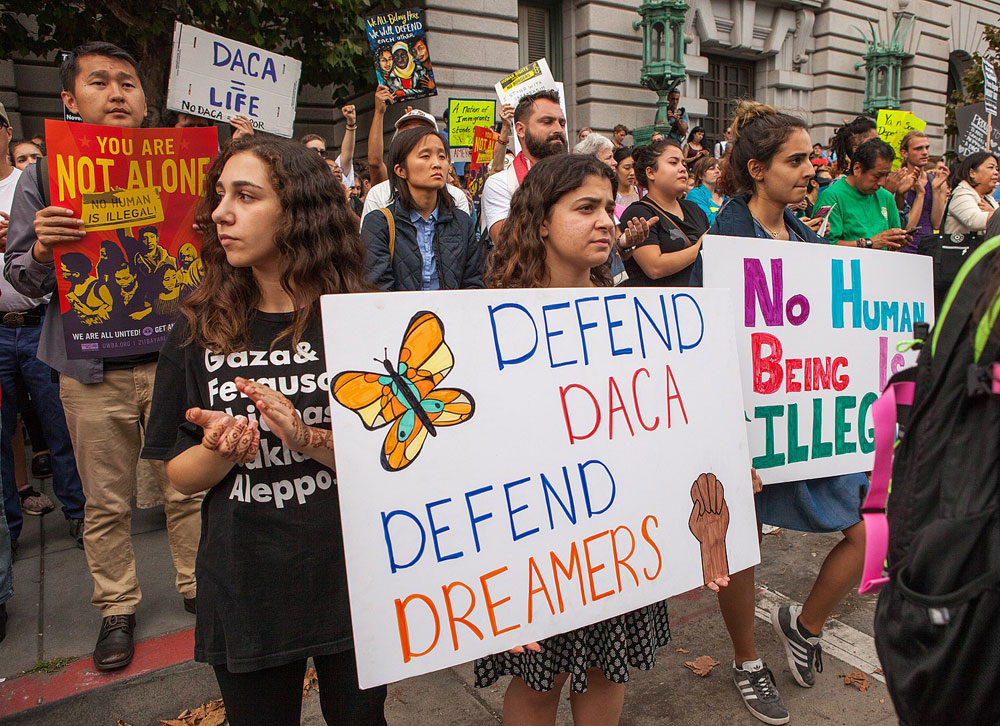
June 28, 2019; New York Times and Washington Post
Eight hundred thousand DACA recipients will find their state of limbo has just become more treacherous. As they closed their session, the US Supreme Court reluctantly agreed to take a combined three-case suit by the federal government to declare the DACA program illegal. The one-hour hearing will take place in the fall of 2019 with a decision most likely in the spring or summer of 2020, right amid the 2020 election fervor.
Some background is called for, here. DACA—Deferred Action for Childhood Arrivals—was initiated by an executive action of President Obama in 2012 to allow children who were brought to this country illegally by their immigrant parents to be able to remain here, get work permits, and not face the threat of deportation. But DACA did not give these children, known as Dreamers, any sense of a future with permanence or a path to citizenship in the country that, for many, was the only home they had known.
While from time to time President Trump and members of his family and administration have spoken warmly and kindly about DACA and Dreamers, in 2017 he moved to permanently terminate the program. Threatened by potential lawsuits from conservative states’ attorneys general, Trump acted to end it, calling it an “end-run around Congress.” But in so doing, he gave Congress six months to come up with a legislative remedy. When Congress failed to act in that timeframe, the federal courts stepped in.
In two federal court cases in 2017, one in San Francisco and one in Richmond, Virginia, the federal government lost. In ruling against the government, the court questioned the validity of the legal arguments being presented by the administration and “the cruelty and wastefulness of deporting productive young people to countries with which they have no ties.”
Sign up for our free newsletters
Subscribe to NPQ's newsletters to have our top stories delivered directly to your inbox.
By signing up, you agree to our privacy policy and terms of use, and to receive messages from NPQ and our partners.
Now, amidst the chaos and angst of the immigration battles and the Presidential race, the issue of DACA and the Dreamers will again be played out—this time, in the Supreme Court. The administration has not done well in the courts on this issue:
So far, appeals courts in California, New York, Virginia and a district judge in the District of Columbia have said that reasoning is wrong. (A judge in Texas said the program was illegal but declined to rule that it should cease.) The judges who have ruled against the Department of Homeland Security’s justification for ending DACA say it must be based on more than just a belief about its legal underpinnings.
“To be clear: we do not hold that DACA could not be rescinded as an exercise of Executive Branch discretion,” Judge Kim McLane Wardlaw said in the 9th Circuit’s opinion. “We hold only that here, where the Executive did not make a discretionary choice to end DACA—but rather acted based on an erroneous view of what the law required—the rescission was arbitrary and capricious under settled law.
But this all might be moot if Congress can get its act together and do something on DACA before the case is finalized. The House of Representatives did pass the American Dream and Promise Act this June. It would permanently block Dreamers from deportation and would provide a pathway to citizenship for 2 million immigrants without legal status. As soon as the Supreme Court announced that it would hear the DACA case, Senator Richard Durbin (D-IL) called upon the Senate to take up this bill. But with Senator Mitch McConnell (R-KY) controlling what will and won’t get a vote in the Senate these days, the chances of this bill seeing the light of day are slim and none.
So, if you are a Dreamer, you may need to take your chances with a very unpredictable Supreme Court. Whatever the Court decides next summer, we can expect it will cause more than ripples in the Presidential race. A decision for the Dreamers will fire up Trump’s base, and a decision against them will do the same for the Democratic side. The question that will remain is, did we do what was just for these young people?—Carole Levine













